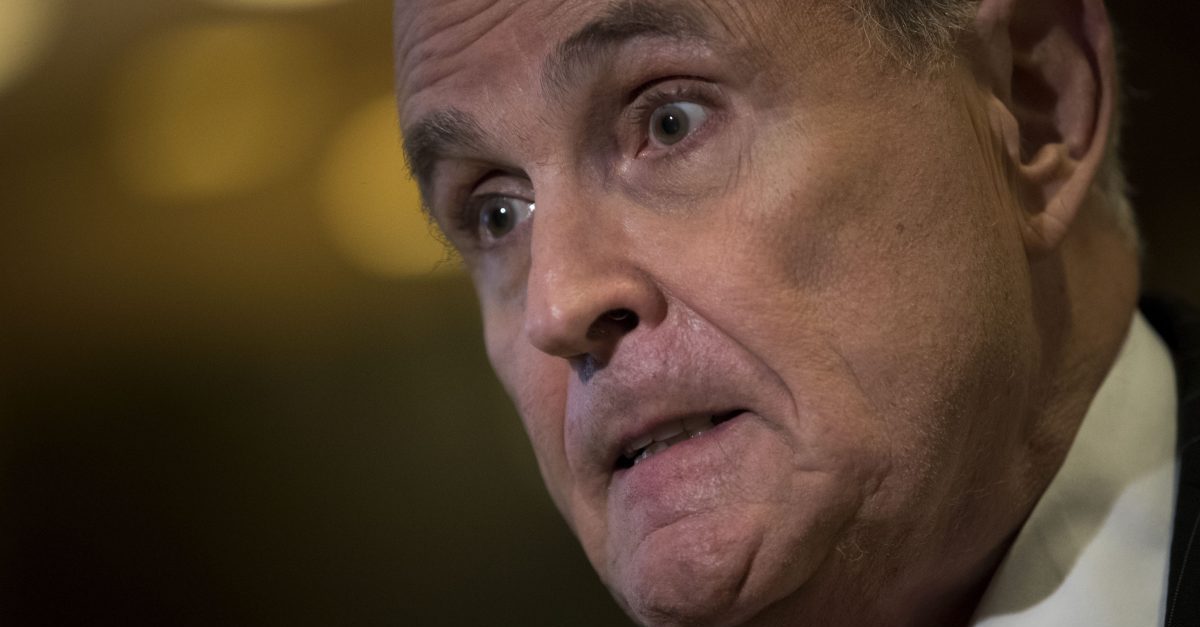
Rudy Giuliani has been confident that Special Counsel Robert Mueller will wrap up his Russia investigation in the relatively near future, so as not to affect–or appear to affect–November’s midterm elections. He claims that Mueller himself indicated as much, and more recently made a bold assertion that if Mueller doesn’t do this, he’ll be breaking the Justice Department’s rules.
“I think if it isn’t over by September, than we have a very, very serious violation of the Justice Department rules that you shouldn’t be conducting one of these investigations in the 60-day period,” Giuliani said in a Wednesday appearance on Hannity.
Indeed, there is an unwritten Justice Department rule against making announcements about investigations or filing indictments within 60 days of an election. Of course that’s very, very different from what Giuliani said.
First off, as I just mentioned, the DOJ’s 60-day rule is “unwritten.” That means it’s not an actual rule, just something that is understood as frowned upon. Second, and more importantly, is that this “rule” doesn’t say anything about concluding investigations within 60 days of an election.
The policy is about making splashy public announcements and filing charges. This makes sense, because doing this soon before an election could sway voters, and could give the impression that law enforcement officials are making decisions under the influence of politics. That’s why it was such a big deal when then-FBI Director James Comey made announcements regarding the investigation of Hillary Clinton‘s personal emails. To this day, Clinton blames Comey for her loss, Comey spoke out so close to Election Day.
Robert Mueller has been very good about keeping the specifics of his investigation under wraps until he’s ready to file court documents, so there’s no reason to believe that this would change. As long as he doesn’t indict anybody within 60 days of the midterms, he’d be in accordance with the unwritten rule, even if he kept the investigation going even after the election itself.
Peter Zeidenberg, who was deputy special counsel in the Scooter Libby case and also worked with Mueller in the past, told Time earlier this year that this rule won’t effect Mueller at all.
“I don’t think it’s going to affect his timeframe. I think he’s probably moving as rapidly as he can,” Zeidenberg said. “He’s moved very quickly so far. I don’t think that’s going to slow down, and I don’t think it’s going to stop except for maybe that small window right before the midterms, when he may want to hold off on issuing anything. That’s about it.”
Former DOJ attorney Eric Columbus went even further, saying that Mueller would even be able to indict people during the 60-day period, as long as they weren’t cases that would impact the elections.
“None of the indictments we’ve seen so far strike me as the type that would be too politically sensitive to be filed too close to an election. Especially an election in which the President is not on the ballot,” Columbus told Time. “Those are not indictments that suggest guilt by the President or anyone close to him. If Mueller is continuing to indict people in that way, then I don’t think there’s much concern regarding the proximity of the election.”
Mueller may very well wrap things up by September if he’s prepared to do so, but there is no indication that he has to, despite what Giuliani is saying. As long as he doesn’t make any waves during the 60-day window, there should be no reason for complaints. Of course, if Rudy’s current narrative is any indication, he and President Trump may be preparing to use the investigation as an excuse to complain any, to rally their base before they go to the polls in November if the probe isn’t over by then.
So far, though, even Giuliani has said that Mueller has been following DOJ guidelines, particularly the one about not indicting a sitting president. There’s no reason to think he won’t continue to go by the book–even the unwritten parts.
[Image via Drew Angerer/Getty Images]
This is an opinion piece. The views expressed in this article are those of just the author.